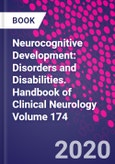This is one volume of a two-volume work on neurocognitive development, focusing separately on normative and non-normative development. The disorders and disabilities volume focuses on disorders of intellectual abilities, language, learning memory as well as psychiatric developmental disorders. The developmental aspects of neurological diseases in children is also covered. Chapters discuss when and how these disorders develop, the genetics and neurophysiology of their operation, and their evaluation and assessment in clinical practice. Assessment, treatment, and long-term outcome are provided as well as advances in methods and tools for assessment.
This book will serve as a comprehensive reference to researchers in cognitive development in neuroscience, psychology, and medicine, as well as to clinicians and allied health professionals focused on developmental disabilities (child neurologists, pediatric neuropsychologists, child psychiatrists, speech and language therapists, and occupational therapists.)
Table of Contents
Section I. Specific Neurodevelopmental Disorders 1. Developmental coordination disorder 2. Language disorders 3. Attention deficit hyperactivity disorder 4. Developmental dyslexia: a new look at clinical features and brain mechanisms 5. Learning disabilities: developmental dyscalculia 6. Borderline intellectual functioning 7. Nonverbal dysfunction syndrome 8. Memory dysfunctions Section II. Complex Neurodevelopmental Disorders 9. Intellectual disability 10. Autism spectrum disorder 11. Epilepsy 12. Multidimensional impairments Section III. Assessment of Neurodevelopment: Methods and Tools 13. Interdisciplinary assessment 14. Sensory assessment: neurophysiology in neonates and neurodevelopmental outcome 15. Neurologic assessment 16. Psychiatric assessment 17. Neuropsychological assessment 18. Structural neuroimaging 19. Functional magnetic resonance imaging 20. Clinical neurophysiology: research methods and event-related potential components as assessment tools 21. New technologies and future trends Section IV. Patient Care, Rehabilitation and Long-Term Outcomes 22. Multidisciplinary treatment plan for challenging behaviors in neurodevelopmental disorders 23. The therapeutic alliance between the child, parents and health professionals 24. Principles of early intervention 25. Cross-modal plasticity and central deficiencies: the case of deafness and the use of cochlear implants 26. Cognitive remediation for neurodevelopmental disabilities 27. Education for students with neurodevelopmental disabilities resources and educational adjustments 28. Quality of life of children and families








